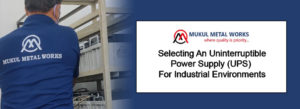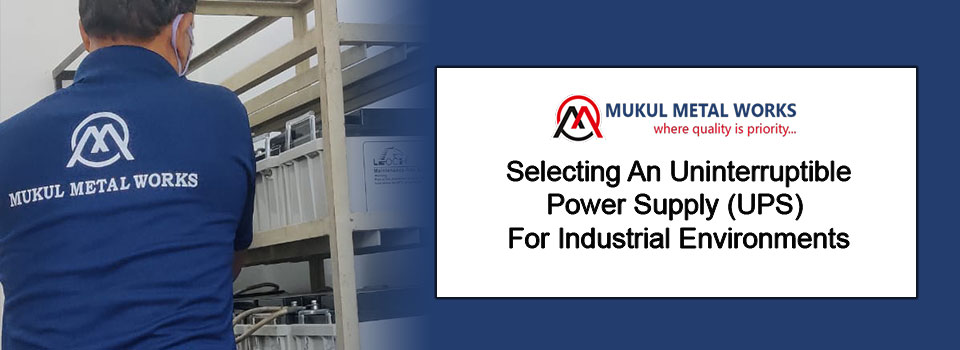How to select Uninterruptible Power Supply (UPS) for Industrial Environments?
How to select Uninterruptible Power Supply (UPS) for Industrial Environments?
Here, we guide how to select Uninterruptible Power Supply (UPS) for Industrial Environments
As we all know the industries/factories/organizations contain a host of sensitive IT equipment that is hungry for electrical power.
What do you mean by UPS?
A UPS system is a device ready to supply power to critical IT equipment in the event that the main electrical power supply is cut. As such, a UPS is an essential part of any business continuity strategy.
Why are UPS systems important?
The main reason for deploying a UPS system is to provide a kind of insurance policy against complete power failure or intermittent power failures. In this way, UPS systems ensure that the IT processes and workflows being undertaken by the organizations continue as normal.
Operating an organization without a UPS leaves you open to sudden, unexpected downtime that may last for an indeterminate period.
UPS systems vary in cost according to how much power they are capable of producing and for how long (runtime).
The larger the requirement, the more expensive the UPS system will be to purchase.
Other factors impacting on cost would be the kind of UPS technology used and any unusual design characteristics.
Of course, the purchase price of a UPS system is only part of its whole-life cost. Other considerations include:
- Shipping (UPS systems are typically very heavy)
- Overall solution design
- Installation and commissioning
- Servicing and maintenance
- Consumables e.g. batteries, fuel
What kinds of UPS are there?
There are three main UPS technologies:
- Battery UPS
Most UPS systems operate on the principle of using standby batteries to provide a defined runtime period against a given load. The batteries are permanently online and available to autonomously take over the power supply for the organizations once a power drop or failure is detected. - Rotary/Flywheel UPS
Flywheel-based rotary UPS systems use stored energy in the form of a high-mass spinning flywheel using magnetic bearings. In event of power drops or failures, these can deliver valuable seconds of immediate power to the organizations to avoid disaster. - Fuel Cell UPS
Fuel cells are essentially batteries that do not run out of energy so long as they are fed with sufficient fuel. Energy is created from chemical reactions resulting from changes to the fuel produced within a specially-designed polymer exchange membrane. Fuels include hydrogen, phosphoric acid, solid oxide, and molten carbonate.

How do I go about choosing a UPS that’s right for my organization?
Here are three key areas to consider:
- Sizing
Undersizing your UPS can have disastrous consequences. Oversizing can be a waste of money and result in an inefficient system. Sizing your UPS correctly ensures that you have enough power to supply to mission-critical organizations. Sizing your UPS properly means finding out what your power requirements are. - Single-phase vs. 3-phase power
Your organizations will either be served by single-phase or 3-phase power. This is important because UPS platforms are purpose-built to operate in one or the other. Ask your facilities/estates manager, your utility provider, or a qualified electrical contractor if you aren’t sure which your environment is being powered by.However, if you are currently on single-phase power and your power requirement is growing, you may need to change your underlying power distribution as well as your UPS in order to achieve the resilience and reliability you are looking for.
- Scalability
Energy needs associated with IT usage can be unpredictable and it is a constant challenge to plan for change without compromising power protection.
The answer lies in operating a UPS infrastructure with sufficient scalability to cope cost-effectively and non-disruptively with growing power demands.Staying on top of your power protection is critical to protecting your expensive equipment and valuable data. A UPS system can be monitored in many ways, from a basic LCD screen to a full software package that allows you to monitor and control the UPS system remotely.
Hire Service for Online UPS capacity from 5KVA to 1000KVA of EMERSON UPS with SMF Battery for UPS 12V 7AH to 200AH. Online UPS Rentals from (5KVA to 1000KVA ).
Call Mukul Metal Works for your Rental Query Now. @ +91-9810644449

One thought on “How to select Uninterruptible Power Supply (UPS) for Industrial Environments?”
The blog was very helpful for me to cleared all the doubts will were there in my mind regarding UPS.